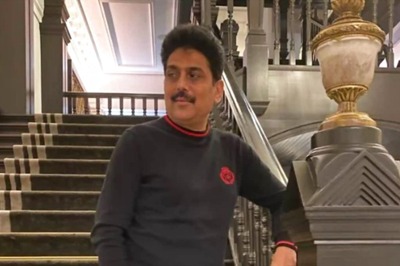
views
As an unprecedented global financial crisis blows away established beliefs about capitalism and free markets, the world starts looking out for new ideas. The best ones may come from these people
 Paul Krugman
Paul Krugman
Is your economy teetering? Are consumers playing truant? Call up this Princeton University professor and New York Times columnist to get a neo-Keynesian prescription for economic depression. The man is busy, but get him to tell you why your currency should not have a fixed peg. Will that lead to a Piranha-like invasion on your currency? Well, even that can make your exports competitive and keep you in business.
 Joseph Stiglitz
Joseph Stiglitz
Nobody was listening to the old man and his criticism of free market fundamentalists. And that’s when he won the Nobel Prize. For a while, he was relegated to addressing World Social Forum meetings. But now, policy makers see what he had all along warned about. He had foreseen a lot of troubles, especially the market failures. Now Stiglitz’s Third Way, which advocates a limited but important role for the state, is emerging as a crucial answer for the big questions.
 Robert Shiller
Robert Shiller
You like bubbles. Admit it. Your last bonus had much to do with those exuberant times. Well, now that you are down on your drink and your house is worth less than that last peg, start listening to Shiller. It is not often that one makes two Cassandra calls. Shiller rightly called the stock market’s irrational exuberance in 2000 and the real estate market’s peak in 2005. You did not listen to him then? Shame on you.
 Raghuram Rajan
Raghuram Rajan
Yes, yes… It’s about saving capitalism from capitalists. But wait. Rajan had spoken about how to make free markets work. Well, they seem all broken. But Rajan did make a few interesting points. One, organised private interests can lobby and change regulations. This is exactly what investment banks did with regulators to let them take almost $30 of debt for each of their own dollar. The result: a complete blow-out. He had also suggested a social safety net.
 Howard Davies
Howard Davies
Now that the bad boys of the financial world have broken the palace chandelier, almost everyone wants them to be disciplined. There are calls for tougher regulation. And Howard Davies, who headed the Financial Services Authority (FSA) in the UK, may be the man to turn for advice. Davies’ book on financial regulation may become a handy guide for many countries looking to police the men who run banks and other such assorted businesses.
 Edwin (Ted) Truman
Edwin (Ted) Truman
A concept that marries the state and the markets is the sovereign wealth fund, which invests government money in markets. Edwin Truman, former assistant secretary of the US Treasury and now a researcher at Peterson Institute, specialises in such funds. Truman says sovereign funds are needed, but they must be regulated and made more transparent. After all, it is easier to snoop on the government than on an errant investment bank.
 Mohamed El-Erian
Mohamed El-Erian
Not every academic works with cold facts on the ground and not every practitioner has the faculty of abstract thinking needed to make the world a safer place, financially speaking. A man who straddles both worlds is Mohamed El-Erian, CEO of bond investor Pimco and the author of When Markets Collide. He says that the current turmoil happened because the global markets were anchored in a certain mindset representing the supremacy of the US and its model of economic growth. The transformation is towards a new financial world where other countries too will play their big parts.
 Nassim Nicholas Taleb
Nassim Nicholas Taleb
Talent counts but not as much we might believe. Luck counts for a whole lot more. Don’t mistake luck for ability. If you think you are too smart, the world will soon put one over you. Tenets of modern finance are more like shaky pillars. Extreme events shape the world and they occur far more frequently than assumed. Therefore, the entire temple of finance might need to be rebuilt. People liked reading Taleb but few practitioners took him seriously. Now, this philosopher, trader, fund manager, mathematician and probabilistic thinker will be heard. We are all waiting for Black Swan sightings now.
 Richard Thaler
Richard Thaler
When you see a behavioural economist, pretend he doesn’t exist. That has been the attitude of finance and economics professionals. Thaler, along with his colleagues, Daniel Kahneman and Amos Tversky, has highlighted a range of psychological issues that prevent us from being the humans that conventional economists expect us to be. President elect Barack Obama has benefited from his advice. Nudge: Improving Decisions About Health, Wealth, and Happiness, a book co-authored by Thaler, explains how institutions can help people make better choices.
 He Fan
He Fan
Henry Paulson may have talked tough on the need for China to let its currency appreciate against the dollar, but He Fan did not think so, at least four months ago. This economics researcher at China Academy of Social Sciences defended China’s right to keep its currency where it was. And that’s exactly what China did, though it did let it appreciate just a wee bit— showing more style than intent. But now that the economic recession is firmly upon us, He Fan is thinking otherwise. Maybe the Chinese government will listen to him once again.
Liked the article? Download as PDF


















Comments
0 comment